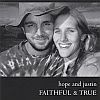Tuesday, June 19, 2007
Fanciful tales I doubt I'd be sharing anything novel by digressing on how important imaginative play and stories are for children. So I'd just like to recommend a book that has been a tried and true treasure from my own childhood and that is still a proven gem with my own children: Told Under the Magic Umbrella. While it's out of print now, it's worth your time trying to locate it through a used online bookstore. The book is full of modern fairy tales (or "fanciful tales") which serve a distinct niche in the brain of a child. Probably most of kids books you find in the library are of this sort. But there is a HUGE difference between kiddy stories and children's literature. One is like cotton candy for the brain... not always BAD for kids, but certainly devoid of any nutrition... any real or significant meaning. And this is probably the majority of books currently on the market now. The other is the whole Easter feast; these types of stories "...show life from a new angle, like objects seen through a prism. It can open fresh ranges of vision and understanding, rouse the perceptions of beauty in hitherto disregarded things." Let me just share an excerpt from the Foreword of "Magic Umbrella" that explains this a bit more:
I doubt I'd be sharing anything novel by digressing on how important imaginative play and stories are for children. So I'd just like to recommend a book that has been a tried and true treasure from my own childhood and that is still a proven gem with my own children: Told Under the Magic Umbrella. While it's out of print now, it's worth your time trying to locate it through a used online bookstore. The book is full of modern fairy tales (or "fanciful tales") which serve a distinct niche in the brain of a child. Probably most of kids books you find in the library are of this sort. But there is a HUGE difference between kiddy stories and children's literature. One is like cotton candy for the brain... not always BAD for kids, but certainly devoid of any nutrition... any real or significant meaning. And this is probably the majority of books currently on the market now. The other is the whole Easter feast; these types of stories "...show life from a new angle, like objects seen through a prism. It can open fresh ranges of vision and understanding, rouse the perceptions of beauty in hitherto disregarded things." Let me just share an excerpt from the Foreword of "Magic Umbrella" that explains this a bit more:The modern fairy tale-- or fanciful tale, to make a useful distinction-- takes full account of this creative instinct. It differs from its long line of predecessors in concerning itself not so much with fantastic elembents outside the child's experience as with the more everyday things of his own world. It realizes that magic, like charity, begins best at home.
Labels: Books Music Culture
 Unknown ::
1:33 PM ::
2
Comments
Unknown ::
1:33 PM ::
2
Comments









